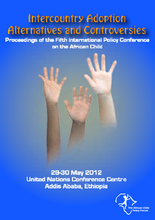The Proceedings report presents summaries of all presentations delivered and of all plenary discussions held during each session of the Fifth International Policy Conference on the African Child (IPC) held on 29 and 30 May 2012 in Addis Ababa, Ethiopia, which brought together experts, policymakers, and key stakeholders to discuss various issues and the implications of intercountry adoption in Africa.
All five IPCs to date aimed at raising awareness of circumstances affecting children, with the goal of promoting the protection and rights of the African child. The primary objectives of the Fifth IPC were to provide a platform for sharing information and experience on intercountry adoption, to promote action on this form of adoption consistent with the best interest of the child, and to adopt a Pan-African framework on intercountry adoption. Conference delegates called upon:
- African States to assume and honor their responsibility for ensuring the well-being of Africa’s children without parental care,
- Civil societies to monitor government compliance with their treaty obligations, treaty bodies such as the African Committee of Experts on the Rights and Welfare of the Child and the UN committee on the Rights of the Child to pay special attention to the compliance of countries involved in intercountry adoption.
The first day of the conference consisted of three sessions. The first session, Intercountry Adoption: The African Context, which presented a contextual overview of intercountry adoption in Africa based on studies carried out by ACPF as well as by other organizations. The second session, International Law and Intercountry Adoption, presenters emphasized the essential corollary between law and intercountry adoption. The third session, Country Experiences on Intercountry Adoption, looked into different African states and their legislative actions to safeguard children of intercountry adoption. The second day’s sessions include a keynote address from Dr. Najat Maalla M’Jid, UN Special Reporter on the sale of children, child prostitution, and child pornography and discussions on experiences from receiving countries. Several approaches and options to intercountry adoption were shared among participants and methods for building a Pan-African regulatory framework for intercountry adoption were highlighted.

